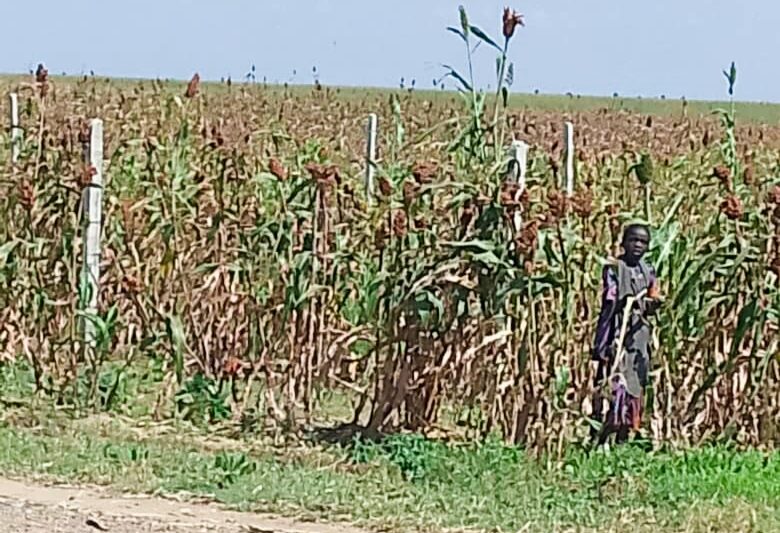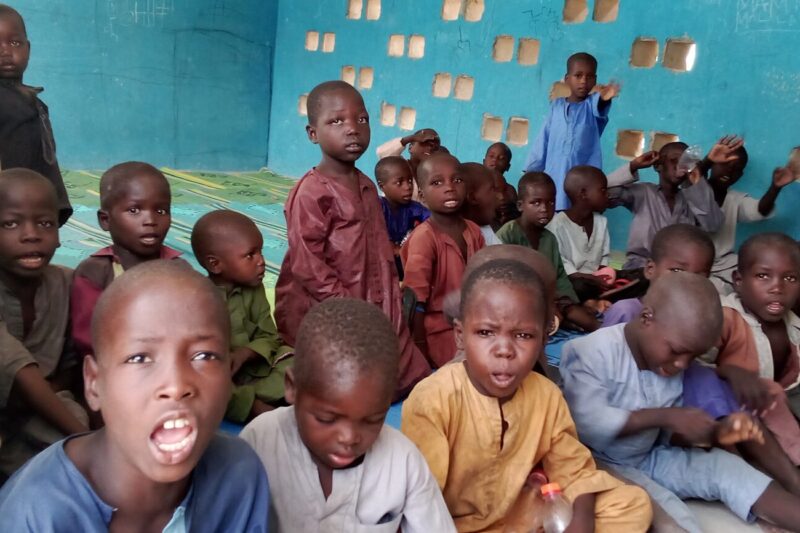As people around the globe commemorate World Food Day, humanitarian agencies say the number of critically malnourished children is likely to escalate in the aftermath of the flood.
As people around the globe commemorated World Food Day on Wednesday, October 16, there was little to celebrate in Borno State in Nigeria’s northeast, where an “overwhelming” number of children are already suffering from severe acute malnutrition (SAM).
The massive flood that engulfed the state’s capital, Maiduguri, and environs on Tuesday, September 10, destroyed food stocks, disrupted agricultural activities and displaced more than 400,000 people.
Aid agencies say the already critical humanitarian crisis is expected to worsen significantly in the aftermath of the flood.
Nigerians across the country are experiencing a cost-of-living crisis.
When President Bola Tinubu came into office last year, he announced he was removing the fuel subsidy which immediately sent the price of petrol soaring.
With the fuel hikes, the cost of all commodities – in particular food, even basic staples, and transport – increased.
In June, Nigeria’s headline inflation rate accelerated to 34.19%, the highest since March 1996. The naira is in freefall, depreciating more than 50% in the past year.
A study by the United Nations Food and Agriculture Organisation (FAO), the Global Alliance for Improved Nutrition and the German development agency, GIZ, says more than 31.8 million Nigerians are acutely short of food.
The Borno State government has warned that the devasting flood could have severe consequences, including seriously affecting food security.
Grain and vegetable depots were submerged in the flood, leading to a shortage of food items and skyrocketing prices for the limited supplies available.
Prolonged insecurity – including persistent attacks by insurgents on farmers – has affected food production, compounding the humanitarian crisis.
Fanna Bukar, a resident of Maiduguri, told RNI that “World Food Day is celebrated only where there is no hunger”.
“It not celebrated in a place like Nigeria where people are struggling to survive because of the high cost of food items.
“There is hunger not only in Borno State but other parts of the country as well. Today, no average Nigerian can afford three square meals a day.
“The price of food has skyrocketed. Before, one plate of rice was sold for not more than ₦1,000. But now it costs more than ₦2,000. In fact, in some rural communities, one plate of rice is being sold for ₦5,000.
“The government needs to step up measures to stabilise the prices of food items across the country so that everyone can access food at affordable prices.”
Mohammed Mustapha, also from Maiduguri, said World Food Day did not mean much to people who “struggle to get something – anything – to eat every day”.
“Nigeria has become a place where it is the survival of the fittest. Everyone is struggling. The cost-of-living crisis is affecting us all. We are experiencing severe hardships.
“The attacks on farmers have affected food production – many farmers cannot go to their lands because it is too dangerous. They face abductions and even death. And low food production means higher prices. It’s a vicious circle.”
Ibrahim Dauda said the government had to initiate people-oriented policies to stabilise the price of food and reduce inflation.
“The government also needs to beef up security. If it wants food production to increase, it needs to ensure the safety of our farmers. That’s the only way we will ever attain food security.”
Fatima Mohammed Attom stays in the Kangar-Makka internally displaced persons’ camp in the Ali-Kotoko area of Maiduguri.
“There are people from 44 households who are taking refuge at the community camp but no one can afford basic staples, let alone nutritious food. As a result, many women and children are suffering from severe malnutrition.
“Many pregnant women, nursing mothers and children have lost their lives because of famine and severe malnutrition. Most times, when we visit a clinic or health facility in the area, the health workers tell us that we are suffering from starvation and we need to eat nutritious food to build up our strength. But we can’t afford it.
“If the government and humanitarian agencies do not come to our aid and provide food and nutritious meals, we will all starve to death.”
Mustapha B Mala, an agricultural expert and a former employee of the Borno State Agricultural Development Programme, said World Food Day was significant because it was a global call for action to stop hunger and malnutrition.
“The United Nations is calling on all stakeholders – including governments, organisations, farmers, the corporate sector and the public – to work together to address food security concerns.
“It is only though a collective effort that we will achieve a zero-hunger world.”
Mala said the Borno State government had unveiled several initiatives and policies to promote agricultural activities and boost food production.
“The state government has given machinery and equipment to farmers in the Monguno, Mobbar, Kukawa and Ngala local government areas, including seeds, chemicals, pesticides, solar-powered boreholes, tractors and water pumps for irrigation farming.
“Unfortunately, the flood affected farmers in Maiduguri and other parts of the state and it will take time for them to recover.”
The International Rescue Committee (IRC) and Médecins Sans Frontières (MSF – also known as Doctors Without Borders) expressed concern about the “overwhelming levels of malnutrition” in Borno State, which they said were likely to escalate in the aftermath of the flood.
“The impact of the severe flooding in northeast Nigeria has not only displaced thousands of families but is expected to worsen the already critical crisis of severe acute malnutrition [SAM] in children because of the destruction of food stocks, disruption of agricultural activities and displacement of families,” the IRC said.
“Malnutrition rates, already high due to the lean season, are expected to increase. IRC mass screenings in displacement camps in Maiduguri have revealed high levels of malnutrition cases. Adult malnutrition is also becoming a concern, with more people suffering from stomach ulcers caused by hunger.
“The flooding has also overwhelmed already crowded nutrition centres where children with SAM and medical complications are treated, as discharged patients grapple with damaged or no homes to return to.”
Babatunde Ojei, IRC’s Nigeria country director, said: “In Maiduguri, where the IRC operates three nutrition centres, one was cut off by the flood. To help, the IRC has worked with the government to find extra space at another health centre to take in children.
“In addition to the anticipated increase in people facing hunger, a rising number of suspected or likely cholera cases have been reported. Malnourished children are at extreme risk if they contract cholera due to existing vulnerabilities, such as diarrhoea and malaria. We are advocating for the vaccination of all children admitted into nutrition centres as a priority.”
He said the IRC was providing clean water and sanitation services to prevent outbreaks of waterborne diseases.
Dr Christos Christou, president of MSF International, said the devastating flood had worsened the humanitarian crisis in Borno State.
Last week Christou spent two days in Maiduguri: “I have seen why the massive flooding in Maiduguri has gained some attention worldwide – the shocking scale has affected millions of people.
“But it is not the only region of Nigeria affected by flooding. People in northern Nigeria have been through a lot – overwhelming levels of malnutrition, frequent outbreaks of vaccine-preventable diseases, lack of medical facilities and medical personnel; all of this has been compounded by continuous insecurity.
“Because this flooding happened at the end of the lean season, it has deprived farmers of even the illusory hope to harvest.
“One of my colleagues, a Nigerian doctor who has been working with MSF for more than eight years, told me that this year is very different. Every year, he said, during this season, we see terrible numbers of malnourished children coming to the hospital in a severe condition.
“But this year, at a time when the peak is supposed to be over, the number of patients admitted to the hospital is not going down.
“Worse, the condition in which they arrive is even more severe than usual. Very often people don’t have access even to basic medical care where they live, and do not have enough money or available transport. As a result, they reach to us too late.”
For the past few years, MSF has seen a significant increase in the number of admissions for malnutrition. The numbers in 2022 and 2023 were already critically high. But between January to August this year, there was a 51% increase in admissions of children with severe malnutrition, compared with the same period last year.
In the first eight months of this year, MSF treated 52,725 children with severe malnutrition, a life-threatening condition, across the whole of northern Nigeria.
Christou said in the aftermath of the flood, the number of cases of malnutrition was likely to escalate.
The theme of this year’s World Food Day was “Rights to Foods for a Better Life and a Better Future”, emphasising the fundamental human right to accessible, nutritious, affordable and sustainable food to ensure everyone’s wellbeing and dignity.
The day is a commemoration of the founding of the FAO in 1945.
According to the FAO, the world’s farmers produce enough food to feed more than the global population, yet hunger persists.
The UN agency said about 733 million people in the world face hunger due to repeated weather shocks, conflicts and wars, economic downturns and inequality.
The poor and vulnerable, many of whom are agricultural households, are most at risk.
“Food is the third most basic human need after air and water. Everyone should have the right to adequate food,” said the FAO.
SHETTIMA LAWAN MONGUNO








